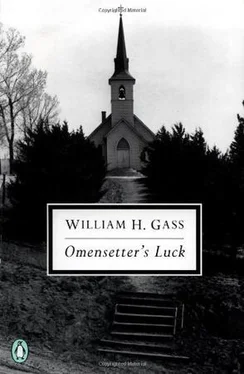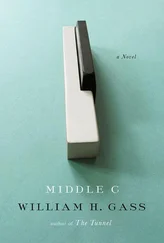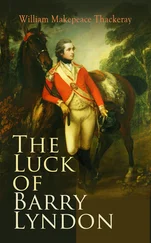I'm not a man of many convictions…
No no no jesus. There were people leaving. But he kited his eyes. In the balconies — choirs. How many? who? one, two… He felt the richness of his robes and the weight of his responsibilities. Light rained through the windows.
In the be- In the be-
He signaled Mrs. Spink to play and cushioned his head on the Bible. A desperate gesture, it would crick his neck, but perhaps it would impress them.
Rattle of notes — she'd begun. He must husband his resources. Husband. What a word. For the sense of our flesh Is slow — how did it go, the old sing-song of St. Augustine? — even because it is the sense of our flesh. He must gain control. The sense of our flesh is slow. Tardus est enim sensus carnis, quoniam sensus carnis est… yes, … its own measure… ipse est modus eius… oh sufficient enough — claws, halls, prick — for the end it was made for… sufficit ad alius, ad quod factus est… yet insufficient — jaw, cunt, lip— ad illud autem non sufficit, ut teneat transcurrentia… lovely … transcurrentia ab initio debito usque ad finem debitum. Me sign is in the word. Is Mrs. Spink the signal? The finger's lascivious tip… whore's hip … In verbo enim tuo, per quod creantur, ibi audiunt: "hinc et huc usque." No, no farther… abuse, abuse… my god.
The number of the noise… so numerous… numberless numbering… numb… numb… what was the numb…?
There was the faint smell of print and paper. The pages felt cool to his cheek. He cuddled his head in his arms. It would be good to remain here and sleep. But in a moment he would have to straighten and face them. He couldn't very well confess then that he had no convictions himself and cared nothing for what they believed, for how they adored confessions. Go home, go home, I have nothing to tell you. J'adore… j'adore… That would nail them in.
Spink'll soon tinkle her tune to a stop
end in a jiffy her jiggery hop
Here — here — look — in this trouser pocket I've greed like a tree toad. But he really wasn't mean or greedy. He wasn't lazy or lustful, ambitious or lordly. He wasn't gluttonous or covetous or swollen with vanity. And where were envy and anger and cruelty in the manner of his life? Wasn't it wonderful how easily the words came. Just lies upon lies on the cooling paper, the faint, faint odor of leather, the darkened heart behind his eyes… envy and envy and envy and anger… envy and anger and aching desire… here — here — I shall raffle off my penis as a prize… no, let me tell you what I've heard: tree roots have been known to vessel the grimmest granite — that's virtue versus vice in one brief homily… oh go home, go home and strike at one another — each so well deserving… I don't know, myself, what to do, where to go… I lie in the crack of a book for my comfort. . it's what the world offers… please leave me alone to dream as I fancy. Then bend to your homes. To dream as I fancy: a lady plump and charming, light through lemon leaves, honorable and distinguished wounds. Ah well now, Mrs. Spink, so you've chewed up your sour little hymn. Furber tugged at his shirt sleeves and pressed his coat smooth.
Let me — like children — as though you were children-let me tell you about it again.
Now then — thank you, thank you all, yes, thank you — as you will remember, in the beginning, you remember, God — God— What had God done?
God had labored five days when He created man. God had sent His presence through the darkness which was lying softly on the surface of the water fast asleep, there to take part, cleaving night from night to make day. Then God had sent His presence down into the middle of the sea, when the sea was asleep, separating the sweet half and lifting it like a canopy above the rest. And then again He'd sent Himself to the sea to gather it, and He'd caught up the remaining water like fish in a net, so that land appeared where the water had been carried away. Thus He labored till the third day.
It would be wise to remember what it was of living things God made on the third day, for He favored the fruits first. He made all seeds — seeds of tender grass and trees of gracious shade. Then He made the moving sun, the alternating moon and brilliant stars, and He appointed some to regulate the night, and others to design and rule the day. Finally, on the fifth, God fastened life in the water and at the water's edge and in the air — whales and seals and salamanders, darting birds. Then as the sea had formed fish after its own, and the air had fashioned even eagles and wild gulls on the model of the wind, so the earth was let to bring forth animals in the living likeness of itself-cattle and snakes and bears, each and every kind.
As you remember… you surely remember…
When this was done, and the first five days had passed beneath the earth forever, and when God saw what He had made was good, only then did He consider creating man, who was to have, as the sun had in the brilliant heavens, and as the moon had among the stars, dominion over life.
So He prepared. He formed dust about His own breath like a chrysalis. He prepared — blowing in His fist, making man a hollow vessel and shaping earth about His breath with His own hands. He prepared — pouring His breath like a precious liquid through the nostrils of the human jar. Consequently man had a likeness in him that was great and holy from the first, sacred and terrible. Just as God in the beginning had divided the darkness to make light, stealing on it while it lay asleep, and just as God had taken the sweetness from the sea as it rested to vault the sky, so mankind was also divided in slumber, and the darkness taken, and a portion of the divine breath too, to make a wife.
It was only right that these divided halves should come together, part and come together, so that what had once been mixed might mix again, so that what had once been sundered might be sundered again, just as God had done these things during the six days of His labor. Everlastingly now, the sea yields up its heaven. What was earth, soon enough again, is earth. Men and women mingle, and are lonely after.
Yet there was already enmity between the dark and the darkness, between salt and fresh, the sea and its fishes, the air and its eagles, the unmoving earth and its teeming kinds, man and his woman; for night had lost half of itself to day, as the sea had to the heavens, and the earth to its millions. Man could not endure alone, without a likeness of himself, and some say, though I believe they are mistaken, that Adam beseeched God for his mate. Yet when Eve was lifted from his side and the skin tied at the navel, he was not completely happy. Adam yearned, without knowing why, and felt envy, since beside him now lay man perfected, his poorest part ennobled, glorified.
I defy you to find where in Holy Writ it says he was satisfied.
Adam wished the return of his softer half. He wished to be whole again as he was in the beginning. Alas. The earth also wished him back. The sea wished to swallow the land again, and deep night groaned against the light.
Such is the lesson — listen carefully to it — of this remarkable creation.
Now there was in heaven, as you know, an angel, prince among them, the Prince of Darkness. And he felt his wife drawn painfully from him, out of his holy body, fully half of himself, and given a place of dazzling splendor. How he hated it, and suffered his loss loudly.
Then at the end of the sixth day, after God had created man and driven his beauty from him like a specter; when at the end of the sixth day man's beauty was driven from him as the day had been driven from sleeping night and the sky looped over the slumberous sea and life drawn from the nodding earth, God ordered the whole Host of Heaven to kneel to this wondrous pair, so to signify their admiration of them.
Читать дальше












![William Frith - John Leech, His Life and Work, Vol. 2 [of 2]](/books/748201/william-frith-john-leech-his-life-and-work-vol-thumb.webp)